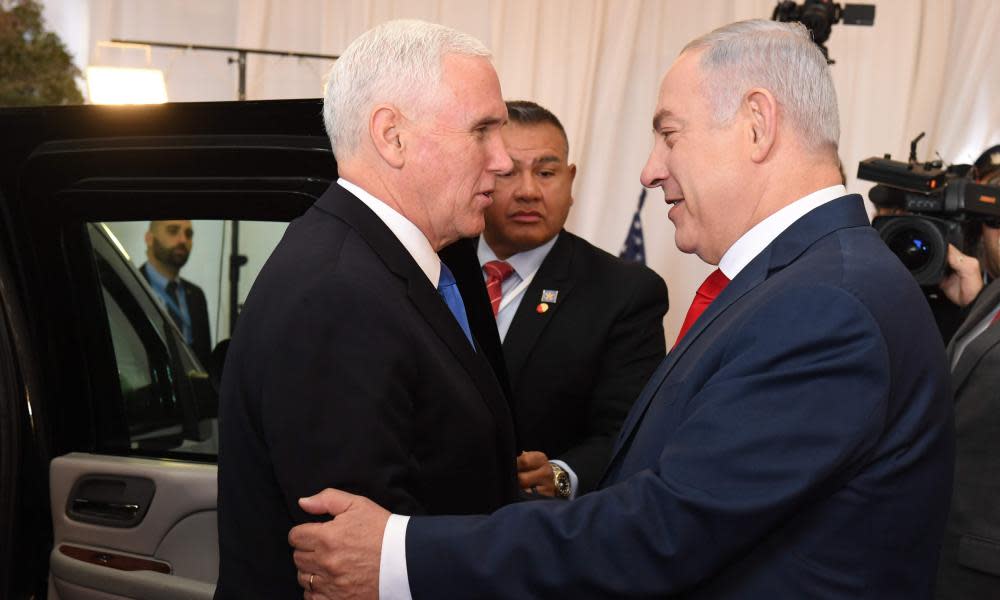Arab-Israeli politicians to boycott Mike Pence's speech to Knesset

The US vice-president, Mike Pence, is to address Israeli politicians on Monday with a speech that an alliance of Arab-Israeli politicians has promised to boycott in protest against Donald Trump’s recognition of Jerusalem as the country’s capital.
“[Pence] is a dangerous man with a messianic vision that includes the destruction of the entire region,” said Ayman Odeh, the chairman of the Joint Arab List, a grouping of four Arab-dominated parties that hold 13 of the Knesset’s 120 seats.
He said Pence came as an emissary for Trump, whom he called “a political pyromaniac, a racist misogynist”.
Israeli media reported concerns among officials that the group would noisily walk out at the start of Pence’s speech to the Knesset. The prime minister, Benjamin Netanyahu, has praised Pence as a “great friend” and said it was “disgraceful” that members of the Knesset planned a boycott.
Pence is the highest-level US official to visit the region since Trump made his Jerusalem declaration on 6 December and promised to move the US embassy to the city, an announcement that prompted Palestinians to reject the US as a peace broker.
The Palestinian president, Mahmoud Abbas, rescinded an invitation for Pence to visit the West Bank following the declaration.
In Jordan on Sunday, Pence tried to reassure King Abdullah the US was committed to restarting peace talks and to a two-state solution to the Israeli-Palestinian conflict, if both sides agreed.
Jordan is the custodian of the Al-Aqsa mosque compound in east Jerusalem that has been at the centre of Palestinian protests after Israel introduced controversial security measures at the site earlier this month.
Though the devices – including metal detectors and barriers – have been removed, tensions remain high. The compound, known to Muslims as the Noble Sanctuary and to Jews as the Temple Mount, is sacred for both sides and has long been a lightning rod for their rival religious and national narratives.
Jordan's Hashemite monarchy has administered the site since 1924, paying for its upkeep and deriving part of its legitimacy from the role. Israel captured east Jerusalem from Jordan in the 1967 war, and annexed the area – a move that was never internationally recognised. But under fragile diplomatic arrangements, Jordancontinued as custodian, which was reaffirmed in its peace treaty with Israel in 1994.
Many of Jordan’s seven million citizens are of Palestinian origin. On Thursday, King Abdullah of Jordan urged Israel to “respect the historical and legal situation in the holy shrine to prevent the recurrence of these crises”.
Trump’s policy shift posed a dilemma for Abdullah, a staunch US ally who derives his political legitimacy in large part from the Hashemite dynasty’s role as guardian of a key Muslim site in Jerusalem.
Any perceived threat to Muslim claims in the city is therefore seen as a challenge to Jordan, where a large segment of the population is of Palestinian origin.
Pence told Abdullah the US has committed “to continue to respect Jordan’s role as the custodian of holy sites, that we take no position on boundaries and final status”.
It was a message Pence also relayed on Saturday during talks with the Egyptian president, Abdel Fatah al-Sisi, in Cairo.
After meeting US troops in Jordan, Pence told reporters he and Abdullah had “a very frank discussion”.
“Look, friends occasionally have disagreements and we agreed to disagree on the decision by the United States to recognise Jerusalem as the capital of Israel,” he said. “But what we agreed on was the need for all parties to come back to the table.
“The Palestinian Authority has been absent from direct negotiations since 2014. And I hope I impressed upon King Abdullah our earnest desire to restart the peace process.”
Abdullah described the Pence visit as a mission “to rebuild trust and confidence” in getting to a two-state solution, in which a state of Palestine would be established in the West Bank, Gaza Strip and East Jerusalem, lands captured by Israel in 1967.
With the Palestinians boycotting Pence, the Israel visit provides little obvious opportunity to build bridges. But it does give Pence, a conservative Christian, and Netanyahu, a rightwinger who has hailed US evangelicals for their support, an opportunity to shine a spotlight on their warm relationship.
Addressing his cabinet on Sunday, Netanyahu said Pence was a “great friend of the state of Israel” and said they would discuss US efforts “to halt Iran’s aggression, the Iranian nuclear programme, and ways to advance peace and security in the region”.
“Anyone who truly wants to fulfil those goals knows there is no substitute to the United States’ leadership,” Netanyahu said.
Abbas, who called Trump’s declaration a “slap in the face”, left for an overseas visit before Pence arrived.
The Palestinian foreign minister, Riad al-Malki, said Abbas would on Monday ask the European Union to officially recognise the state of Palestine when he meets foreign ministers from the bloc “as a way to respond” to Trump’s decision to recognise Jerusalem.

 Yahoo News
Yahoo News 
